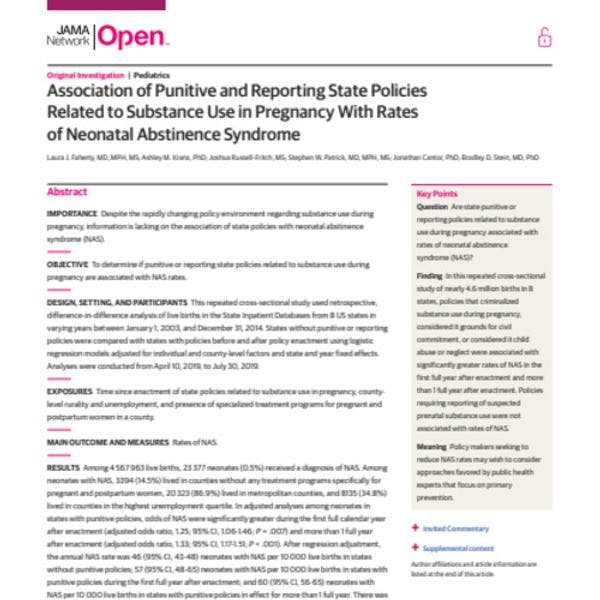Association of punitive and reporting state policies related to substance use in pregnancy with rates of neonatal abstinence syndrome
By JAMA Network
The opioid crisis has affected a substantial number of pregnant women in the United States, with the number of pregnant women with an opioid use disorder (OUD) diagnosis at delivery quadrupling from 1999 to 2014 and prenatal opioid exposure resulting in a 7-fold increase in neonatal abstinence syndrome (NAS) from 2000 to 2014. Neonatal intensive care unit admissions for NAS increased nearly 4-fold between 2004 and 2013, and in some hospitals, NAS accounts for approximately half of all neonatal intensive care unit days. There is substantial state-to-state variation in NAS rates, as well as county-level variation associated with structural factors, such as higher rates of long-term unemployment and less access to mental health care practitioners. Neonates with NAS often require prolonged and costly hospitalizations, with total hospital costs for births with NAS exceeding $500 million by 2014.
Many states have long sought to address opioid misuse in pregnancy, the proximal cause of most cases of NAS, by enacting a range of policies intended to reduce opioid use in pregnancy. A number of states recently expanded policies designed to increase the availability of treatment for women with substance use disorder (SUD), adding to the number of states that had enacted such policies in the 1990s. Such policies have likely contributed to an increase in the number of SUD treatment programs specifically for pregnant and postpartum women, although such programs remain uncommon and are not easily accessible for many women. Many states have also responded by enacting policies that are potentially punitive toward pregnant women, such as policies considering substance use during pregnancy to be child abuse or neglect. From 2000 to 2015, the number of states with these punitive policies increased more than 2-fold from 12 to 25, and the number of states requiring health care professionals to report suspected prenatal drug abuse to child protective services or health officials increased from 12 to 23.
Despite the rapidly changing policy environment, there is a paucity of information on the associations of punitive or reporting state policies being increasingly enacted since 2000 with NAS. To support more empirically informed policymaking, this study sought to address a critical gap in the literature by examining the association of states with punitive or reporting policies related to substance use during pregnancy (hereafter, punitive or reporting policies) with rates of NAS, a proxy for maternal opioid use. We hypothesized that punitive policies, which have been shown to discourage women from seeking prenatal care and SUD treatment, would be associated with higher NAS rates as women would be less likely to engage in the health care system and receive interventions that could reduce prenatal opioid use.
